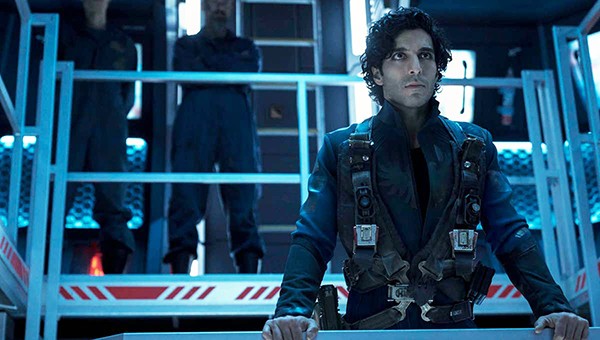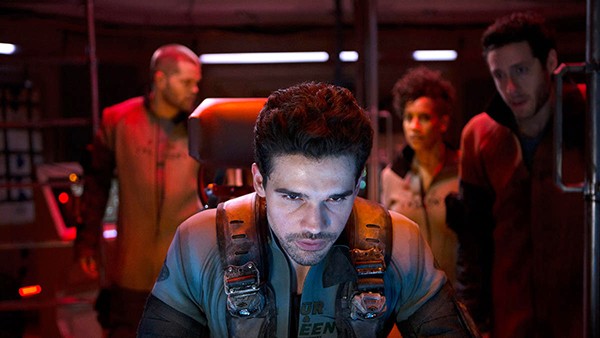Science fiction is always about the present, even if — especially if — it’s set in the future. For The Expanse, the sci-fi TV series which just completed its fifth and best season, that dictum plays out in two ways: What the audience expects, and what kind of future the writers predict.
The Expanse has its origin in a game project by writers Daniel Abraham and Ty Franck. They developed a world where humanity had spread throughout the solar system as a setting for a role-playing game. When they couldn’t find a buyer for the game, they used the setting for a series of sci-fi novels under the pen name James S.A. Corey, beginning with Leviathan Wakes in 2012.

Keon Alexander plays Outer Planets Alliance operative Marco Inaros in The Expanse.
This gave The Expanse stories an advantage. Science fiction was born in cheap novels and trashy magazines. When sci-fi earned “respectability” in the 1960s, Captain James T. Kirk of the USS Enterprise became the face of the genre. After Star Wars made sci-fi the dominant force at the box office in 1977, every cheap, trashy novel with little green men was written with an eventual screen adaptation in mind. But in 2021, sci-fi audiences are used to world-building in computer games like Mass Effect or tabletop RPGs such as Stars Without Number. You can’t reduce The Expanse to a traditional sci-fi premise such as “what if we had flying cars?” The show’s central question is more like “how are people shaped by the systems they’re embedded in?”
It might sound boring when you put it like that, but the wide-open world of 2350 was designed to give players many options. Do you like noir-influenced cyberpunk? You could get that with Detective Miller (Thomas Jane) on Ceres. Space opera more your speed? Climb aboard the gunboat Rocinante (pronounced “row-sin-oh”) under the command of Captain James Holden (Steven Strait).
The setting’s possibilities have allowed the showrunners to adjust from season to season. The noir storylines were going nowhere, so Miller died at the end of season two (the writers studied with Game of Thrones creator George R. R. Martin, so they’re not afraid to kill a main character). The focus shifted to a Trek-style, crew-on-a-spaceship drama for two seasons, as humanity wrestled with the implications of finding advanced alien technology.

The crew of the Rocinante.
After ending season four with the day successfully saved, the crew of the Rocinante went their separate ways. The series’ biggest weakness has always been the flatness of Holden’s character, so season five leans on the ensemble. Pilot Alex Kamal (Cas Anvar) returns to Mars, where he gets a chilly reception from the family he abandoned. Mercenary Amos Burton (Wes Chatham) goes home to Baltimore to face his gangster past. Engineer Naomi Nagata (Dominique Tipper) leaves her lover Holden in search of her long-lost son, only to find baby daddy Marco Inaros (Keon Alexander) has become the Osama bin Laden of the asteroid belt. When Marco attacks Earth with a series of devastating asteroid strikes, former UN Secretary General Chrisjen Avasarala (Shohreh Aghdashloo) leverages the crises to return to the corridors of power — which is like an opiate addict becoming president of Purdue Pharma.
The Expanse‘s vision of the 24th century is quite different from Star Trek‘s post-scarcity utopia. When Trek creator Gene Roddenberry, living during the height of the American empire, looked to the future, he saw progress and enlightenment. When The Expanse looks forward, it sees conflict as usual. Money, hand-waved away by Roddenberry, still rules the solar system. The world of Belter pirate queen Camina Drummer (Cara Gee) is defined by scarcity of air, water, and energy. Martian war hero Bobbie Draper (Frankie Adams) lives in a crappy apartment because she can’t find a job, and one of the most satisfying moments in season five is when Burton steals a rich family’s spaceship to fly a group of refugees off the ruined Earth.
Good guys and bad guys blur: Marco is a terrorist, but he’s got a plan to keep the Belters from starving. Avasarala saves Earth from total destruction, but her first act as Secretary General is to declare martial law. This may not be a rosy view of the future, but looking around at the 21st century, it’s a believable one. At least they solve global warming — although season five ends with the battered Earth in the grips of post-apocalyptic nuclear winter. It’s always something in space.
Working Class Space Heroes: The Expanse Hits its Stride in Season 5
The Expanse is streaming on Amazon Prime